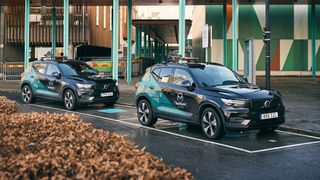Volvo has an EV torture test for its wireless car charging trials
Can top up electric cars as quickly as a wired charger

Volvo is laser-focused on electric vehicles, to the point that its website lists electric models before any of its gas-powered cars. The automaker currently sells a couple of electric models, but has plans to expand rapidly, and will eventually convert its entire catalog to electric power.
Along the way, Volvo will test auxiliary technologies that support EV ownership and make the experience more convenient. Wireless charging promises big-time convenience for busy EV owners, and to help move the tech forward, Volvo has begun testing in its home country of Sweden.
Volvo is far from the first automaker or company to test wireless EV charging. BMW has been at it for years, and recently, Genesis announced a new SUV model with the technology.
That said, the Swedish automaker's plan sounds like an EV torture test. Volvo will run the cars as taxis 12 hours a day and will drive at least 100,000 km per year (62,137 miles) – far more than all but the busiest road warriors drive in a year.
Testing will take place in Sweden, within the Gothenburg Green City Zone. The area is a designated space in the city for testing of sustainable technologies.
As fast as wired charging
To facilitate the process, Volvo says its cars use a 360-degree camera system to properly align for charging. Charging power will be greater than 40 kW, making the wireless system almost as fast as a DC fast charging system. Once parked, charging begins automatically.
Volvo is working with Momentum Dynamics, a company focused on wireless charging technologies, to deliver the units for testing. Other suppliers will step in through the testing process.
Get daily insight, inspiration and deals in your inbox
Get the hottest deals available in your inbox plus news, reviews, opinion, analysis and more from the TechRadar team.
Wireless charging will add convenience to the charging process, but at current speeds it won't be a game changer. One of the largest challenges facing EV adoption is charging time, because even the quickest-charging EVs can take well over half an hour to recover a meaningful amount of range.
That said, wireless charging could free up congestion at charging stations, and may offer a way to offer multiple charging spots in a large parking lot.

After working in the technology and software industry for several years, Chris began writing as a way to help people outside of that world understand the sometimes very technical work that goes on behind the scenes. With a lifelong love of all things automotive, Chris turned his attention to writing new vehicle reviews, detailing industry trends, and breaking news. Along the way, he earned an MBA with a focus on data analysis that has helped him gain a strong understanding of why the auto industry’s biggest companies make the decisions they do.
Most Popular

